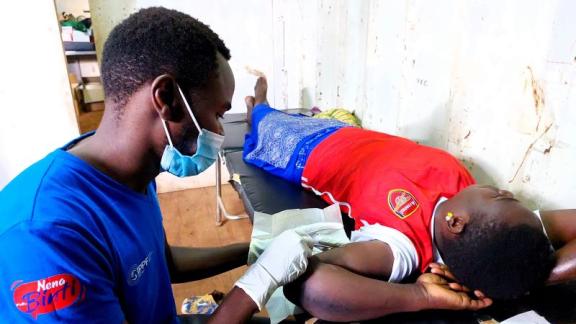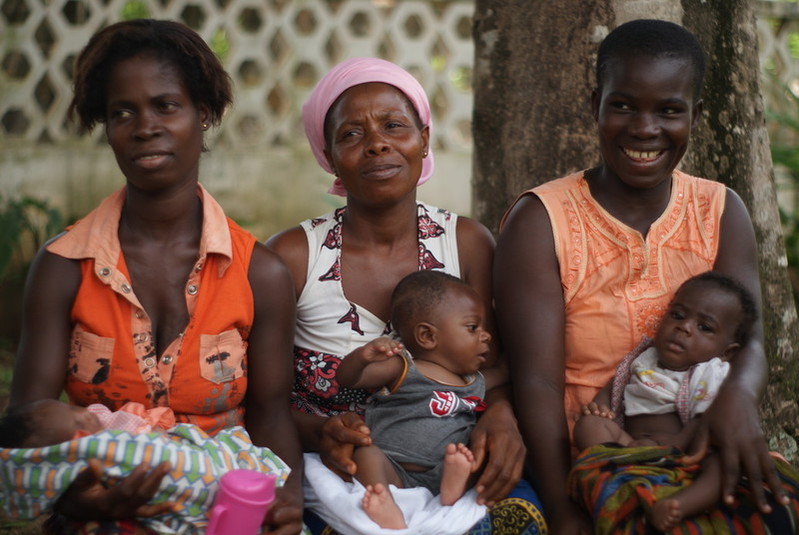Kenya recently experienced heavy downpours that left widespread destruction, including loss of human lives. In this article, we highlight the response of IPPF’s Collaborative Partner in Kenya –Reproductive Health Network Kenya (RHNK) to the humanitarian crisis occasioned by the floods. RHNK’s intervention was in two sub-counties in Kenya’s capital city of Nairobi, which was one of the hardest hit areas. The sub-counties are Embakasi East and Ruaraka. RHNK’s response, in partnership with the Nairobi County government, was supported by funds from IPPF’s humanitarian programme.
Between April – May 2024, Kenya experienced torrential rains combined with mudslides and flash flooding, all of which left a trail of widespread destruction in their wake. The heavy downpours saw several rivers across the country burst their banks, with various infrastructure –including roads and bridges being destroyed or washed away.
During this period, several residential and commercial buildings, schools, police stations, markets and health facilities across the country were left submerged from the heavier-than-usual rainfall.

According to government statistics, over 290 people lost their lives. The floods further resulted in the displacement of over 55,631 households, affecting approximately 278,155 individuals. Another 82,552 households, comprising about 412,763 persons were directly impacted. This situation led to a humanitarian crisis across several parts of the country where, forced out of their homes, populations had to make do in makeshift camps, churches, social halls, and other temporary structures.
Important to note is that during crisis situations such as these, essential health services are often disrupted, with those pertaining to sexual reproductive health and rights (SRHR) being among the most neglected, according to Dr. Augustin Paluku, the Senior Humanitarian Advisor at the IPPF Africa Regional Office.
“Such displacement of populations affects the most vulnerable people in society. One-quarter of those affected by humanitarian emergencies are women and girls aged 15-49. In crisis settings there is also a heightened risk of early marriage, rape and sexual violence, unsafe abortions and unattended births. Transmission rates of STIs, including HIV, increase in emergencies,” says Dr. Paluku.

Desperate situation among displaced populations in Nairobi
Mrs. Robina Anene-Muli is the Reproductive Health Coordinator, in Kenya’s capital city, Nairobi. Her work entails coordinating all reproductive, maternal and new-born health activities and programmes in Nairobi County. Her office is also mandated to collaborate with partners and stakeholders in the reproductive health space.
As the April – May rains continued pounding the country relentlessly, Robina would suffer anxiety as the number of those displaced by floods in Nairobi swelled by the day. She knew what this meant for the vulnerable populations.
“We had pregnant women, women, adolescent girls, teenage mothers, children, men, and the elderly all huddled together in makeshift camps, churches, and community halls. Hurriedly ejected from their houses and in a bid to save their lives, most were unable to salvage anything. Apart from losing household items, they had also lost important documents and their medication including family planning pills, other contraceptives and ARVs.”
The flooding situation had, twice, forced the government to postpone the reopening of schools and all learning institutions.

“The situation was dire,” Robina says. “The crisis did not mean that sexual activities had been put on hold. This presented potential health risks for the displaced. In a situation where they were away from health facilities and could not access condoms and other contraceptives, Pre-Exposure Prophylaxis (PrEP) and Post Exposure Prophylaxis (PEP) –medicines which help prevent HIV infection, the risks included unprotected sex, unplanned pregnancies, and spread of sexually transmitted infections (STIs), including HIV. Worse, at the camps were reported cases of gender-based violence (GBV) and sexual assault including rape. We were staring at the likelihood of unsafe abortions, and possible mortalities from these,” she adds.
Robina knew she had to act fast.
Collaboration with local IPPF partner organization
While she had sufficient supplies and commodities to serve the displaced populations, the required intervention needed much more resources which her office did not have.
Thankfully, she knew of a reliable partner she could turn to –a dependable organization she had worked with before. This organization’s credibility within the Nairobi County health management circles was undoubted.
The organization was Reproductive Health Network Kenya (RHNK).
Robina picked up the phone and dialled.
Ms. Nelly Munyasia, RHNK’s Executive Director answered the call.
“When I received the call from Robina, there was no doubt in my mind that we had to intervene. The need to do so was borne from our mission and that of IPPF –serving the marginalized and vulnerable populations, including those in emergency settings. Our joint intervention would be in the form of a mobile camp/clinic, which would ensure that most of the displaced populations and their host communities were reached with sexual reproductive health services. I quickly mobilized resources, granted by IPPF’s Stream 3 funds under its Humanitarian programme,” she says.
Together, RHNK and the Nairobi County reproductive health management teams -supported by the Medical Officer of Health (MOH) of Embakasi East Dr. Moses Owino and his Ruaraka counterpart Dr. Robert Kariuki, identified the most affected areas and prioritized them. The two sub-Counties of Embakasi East and Ruaraka, which are low-income areas with huge slum populations, had the highest number of displaced people, most being the youth. The two sub-counties would be their locales for intervention.

Five-day successful mobile clinic in a humanitarian setting in Nairobi
That phone conversation between Robina and Nelly resulted in a five-day mobile camp/clinic, undertaken in successful collaboration between RHNK and the Nairobi County government.
A total of 2,555 people were served with SRHR information and services in the five days. All services were offered at no cost, which was a lifeline for the vulnerable populations. The services included the full range of modern family planning methods (implants, pills and injectables) condom distribution, cervical cancer screening and referral services, HPV vaccination for girls aged 10-14 years, HIV testing, pregnancy and post-pregnancy services, as well as child immunization services. Others included counselling, PrEP and PEP services.
“During the mobile camp/clinic, which was undertaken in different sites within Embakasi East and Ruaraka sub-counties, we had erected several tents in strategic locations that were accessible to the target population. We reinforced this with a mobile truck (supported by AMREF) that moved from place to place, ensuring that as many people were reached. Privacy for clients in the tents and in the mobile truck was ensured, which enabled clients to be served with utmost respect and dignity,” says Nelly.

Beneficiaries like Atieno, 21, who accessed the services with her seven-month old baby, shared her sentiments about the mobile camp/clinic.
“I was delighted when I heard the announcement that family planning services were being offered for free at this mobile clinic. For a long time, I had been planning to get the services at the local health center, but it was difficult because I have a small baby and with lots of chores in the house, it was not possible. So, you can imagine how relieved I was to hear that I could get the services right here, and at no cost! I’m happy now because I don’t have to worry about getting pregnant again soon –something that has been my greatest fear,” said the young mother immediately after accessing services.
Robina says she looks forward to more of such successful partnerships with RHNK.
“Even though we had the commodities and supplies needed, it would not have been possible to undertake this activity without RHNK. The organization catered for all the tents, the service providers, the community health promoters, mobilizers and all other expenses related to the five-day activity. We were able to serve 2,555 people in Ruaraka and Embakasi East sub-Counties because of RHNK’s valuable collaboration with us. This is a worthwhile partnership, and we commit to continue working with RHNK on more programmes and activities,” she said.



Follow IPPF Africa Region on Facebook, Twitter, Instagram and You Tube.
when
country
Kenya
Related Member Association
Reproductive Health Network Kenya











